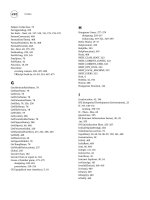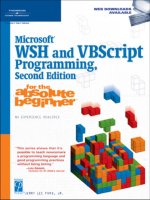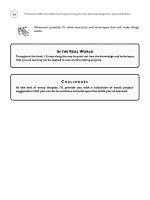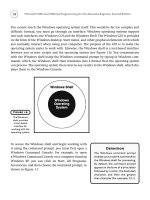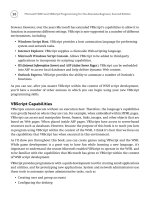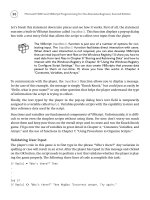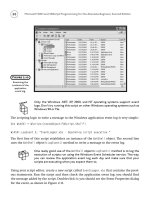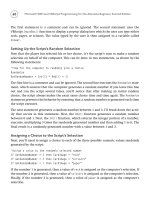Microsoft WSH and VBScript Programming for the Absolute Beginner Part 3 pdf
Bạn đang xem bản rút gọn của tài liệu. Xem và tải ngay bản đầy đủ của tài liệu tại đây (331.06 KB, 10 trang )
xx
Microsoft WSH and VBScript Programming for the Absolute Beginner, Second Edition
Whenever possible, I’ll share shortcuts and techniques that will make things
easier.
TRICK
In the Real World
Throughout the book, I’ll stop along the way to point out how the knowledge and techniques
that you are learning can be applied to real-world scripting projects.
C HALLENGES
At the end of every chapter, I’ll provide you with a collection of small project
suggestions that you can do to continue to build upon the skills you’ve learned.
Part
Chapter 1: Getting Started with
the WSH and VBScript
Chapter 2: Overview of the
Windows Script Host
Introducing the WSH and VBScript
I
This page intentionally left blank
I
n this chapter, you’ll be introduced to a number of topics. These topics
include a high-level overview of the Windows Script Host (WSH) and
VBScript. You will learn how the WSH and VBScript work together to pro-
vide a comprehensive scripting environment. In addition, you’ll learn a little bit
about VBScript’s history and its relationship to other languages in the Visual
Basic programming family of languages. As a wrap-up, you’ll also learn how to
create and execute your very first VBScript.
Specifically, you will learn
• The basic mechanics of the WSH
• How to write and execute VBScripts using the WSH
• Background information about VBScript and its capabilities
• How to create your first VBScript game
Getting Started
with the WSH
and VBScript
1
CHAPTER
4
Project Preview: The Knock Knock Game
In this chapter, as in all the chapters to follow, you will learn how to create a computer game
using VBScript. This chapter’s game is called the Knock Knock game. Actually it’s more of a
riddle than a game, but it provides a great starting point for demonstrating how VBScript
works and how it can be used to develop games and other useful scripts.
The Knock Knock game begins by displaying a pop-up dialog box that reads Knock Knock; it
then waits for the user to respond with “Who’s there?” The dialog between the game and
the player continues until the computer finally displays the game’s punch line. Figures 1.1
through 1.3 demonstrate the flow of the conversation between the game and the player.
Figure 1.4 shows the message that appears if the player does not play the game correctly.
Microsoft WSH and VBScript Programming for the Absolute Beginner, Second Edition
Figure 1.1
The game begins
by knocking on
the door and
waiting for the
player to
respond.
Figure 1.2
The first clue is
provided.
Figure 1.3
The joke’s punch
line is delivered.
Figure 1.4
If the user makes
a mistake when
playing the game,
an error message
providing another
invitation to play
the game appears.
By the time you have created and run this game, you’ll have learned the fundamental steps
involved in writing and executing VBScripts. At the same time, you will have prepared your-
self for the more advanced programming concepts developed in later chapters, including
how to use the WSH and VBScript to develop some really cool games.
What Is the WSH?
The WSH (Windows Script Host) is a programming environment that allows you to write and
execute scripts that run on Windows operating systems. You can use the WSH to create
and execute scripts, which are small text-based files written in an English-like programming
language, from the Windows command prompt or directly from the Windows desktop.
Scripts provide quick and easy ways to automate lengthy or mundane tasks that would take
too much time or effort using the Windows GUI (graphical user interface). Scripts are also better
suited for automating tasks that are not complex enough to justify the development of an
entire application using a language such as C++ or Visual Basic.
The WSH is a 32-bit application that is made up of a number of different components. These
components include the following:
• Script engines
• Script execution hosts
• The WSH core object model
The relationship of each of the components to one another is shown in Figure 1.5.
5
Chapter 1 • Getting Started with the WSH and VBScript
Figure 1.5
The components
that comprise
the WSH.
6
WSH Scripting Engines
A script execution engine is a program that processes (interprets) the statements that make up
scripts and translates them into machine-readable code that the computer can understand
and execute. By creating an environment in which scripts can execute, the WSH makes
script development a straightforward task.
The WSH provides each script with a number of resources. First, the WSH provides script
engines for processing scripts. By default, Microsoft provides two script engines for the WSH:
• VBScript. A scripting language based on Microsoft’s Visual Basic programming
language.
• JScript. A scripting language based on Netscape’s JavaScript Web-scripting language.
Therefore, by default, the WSH can process scripts written in either VBScript or JScript. The
WSH is designed in a modular fashion, allowing Microsoft and third-party software devel-
opers to add support for additional scripting engines. For example, script execution engines
have already been developed for Perl, Python, and Rexx.
Selecting a WSH Script Execution Host
To actually run a script, the WSH uses a script execution host to process a script after a script
engine has interpreted that script. The WSH supplies two different script execution hosts:
• CScript.exe. An execution host that enables scripts to execute from the Windows
command prompt and display text-based messages.
• WScript.exe. An execution host that enables scripts to execute from the Windows
desktop, display messages, and collect user input using graphical pop-up dialogs.
With the exception of the WScript.exe execution host’s capability to display graphical pop-up
dialogs, the functionality provided by WSH’s two execution hosts is identical. In fact, if you
run a script using the CScript.exe execution host, the script can, depending on how it is written,
still display messages using pop-up dialogs.
As both execution hosts provide the same basic func-
tionality, you’re probably wondering which one you
should use. There’s no right or wrong answer here,
and often the selection of an execution host is simply
a matter of personal preference. However, there are
some circumstances in which you may want to choose
one over the other. For example, if you plan to run
Microsoft WSH and VBScript Programming for the Absolute Beginner, Second Edition
Definition
Within the context of this discus-
sion, the term host describes an
environment that provides all the
resources required for VBScript to
execute.
your scripts in the background, or want to schedule the execution of your scripts using the
Windows Task Scheduler service and have no requirement for interacting with the user, you
might want to use CScript.exe. However, if your scripts need to interact with the user—which
will be the case with the games you’ll create with this book—you’ll want to use the
WScritp.exe execution host. Another factor that may affect your selection of a script execution
host is your personal comfort level in working with the Windows command prompt.
Introducing the WSH Core Object Model
The WSH provides one final component, called the core object model, which is critically
important to the development and execution of scripts. The WSH core object model provides
VBScript with direct access to Windows resources.
Examples of the types of Windows resources to which the WSH core object model provides
access include
• Windows desktop
• Windows Start menu
• Windows applications
• Windows file system
• Windows Quick Launch Toolbar
• Network printers
• Network drives
• Windows Registry
The Windows operating system can be viewed as a collection of objects. For example, a file
is an object. So is a folder, disk drive, printer, or any other resource that is part of the com-
puter. What the core object model does is expose these objects in a format that allows
scripts to view, access, and manipulate them. Each exposed object has associated properties
and methods that scripts can then use to interact with an object, as well as affect its behavior
or status. For example, a file is an object, and a file has a number of associated properties,
such as its name and file extension. By exposing the Windows file system, the WSH enables
scripts to access files and their properties and to perform actions, such as renaming a par-
ticular file or its file extension. Files also have methods associated with them. Examples of
these methods are those that perform the copy and move operations. Using these methods,
you can write scripts that can move or copy files from one folder to another or, if you are
working on a network, from one computer to another.
7
Chapter 1 • Getting Started with the WSH and VBScript
Don’t worry if the WSH core object model seems a lit-
tle confusing right now. I’ll go over it in greater detail
in Chapter 2, “Overview of the Windows Script Host,”
and will provide examples of how to use it within your
scripts throughout this book. The important thing to
understand for now is that the WSH enables scripts to
access Windows resources (objects) and to change
their attributes (properties) or perform actions that
affect them (using object methods).
How Does the WSH Compare to
Windows Shell Scripting?
If you work on a computer running a Windows NT,
2000, XP, or .NET operating system, then Microsoft has
supplied you with a second option for developing
scripts, known as Windows shell scripting. Unfortunately,
Windows 95, 98, and Me do not support this scripting
option. This makes the WSH Microsoft’s only universal
scripting solution, and as you are about to find out, the
WSH is the more powerful of the two scripting options.
Windows shell scripts are plain text files that have a
.bat or .cmd file extension. Unlike
scripts written to work with the WSH, which are written using specific scripting languages
like VBScript and JScript, Windows shell scripts are developed using regular Windows com-
mands and a collection of shell-scripting statements. The WSH provides a more complete
scripting environment due in large part to its core object model. However, Windows shell
scripts still offer a powerful scripting solution. This is partly because you can execute any
Windows command or command-line utility from within a shell script. Windows shell
scripting also provides a complete collection of programming statements that include sup-
port for variables, looping, conditional logic, and procedures. For non-programmers, shell
scripts may be easier to read, understand, and modify.
Another difference between script written using the WSH and Windows shell scripts is that
Windows shell scripts only support text-based communications with the user. In other
words, shell scripts cannot display messages or prompt the user for information using graph-
ical pop-up dialogs. Windows shell scripting does not provide support for any type of object
model, like the WSH does. Therefore Windows shell scripts are not capable of directly inter-
acting with many Windows resources. For example, Windows shell scripts cannot directly
8
Microsoft WSH and VBScript Programming for the Absolute Beginner, Second Edition
Definition
In this book, the term property refers
to an object-specific attribute, such
as a file’s name, that can be used to
affect the status of the object.
Definition
In this book, the term method is
used to refer to a built-in function
that your scripts can execute to
perform an action on an object
such as to copy or move a file to
another location.
edit the Windows Registry or create desktop shortcuts. However, Windows Resources kits pro-
vide Windows shell scripts with access to a number of command-line utilities that provide
indirect access to many Windows resources.
To write shell scripts, you must have
a good understanding of Windows
commands and their syntax. You
must also be comfortable working
with the Windows command prompt.
Conversely, to effectively use the
WSH, you must be well versed in one
of its supported scripting languages.
There are many cases in which you
can accomplish the same task using
either Windows shell scripting or the WSH. As a general rule, however, the more complex
the task, the more likely that you’ll want to, or need to, use the WSH. This is true unless you
need to develop scripts that will run on computers using Windows 95, 98, and Me; in which
case, you’ll have no choice but to use the WSH.
If you’re really interested in learning more about Windows shell scripting, read
the Microsoft Windows Shell Scripting and the WSH Administrator’s Guide (ISBN
1- 9 318 41-2 6- 8 ).
You also might want to check out Microsoft Windows Shell Script Programming
for the Absolute Beginner (ISBN 1-592000-85-1).
Understanding How the Windows Shell Works
Even if you have used Windows operating systems for many years, chances are that you have
only limited experience working with the Windows shell. To become a really efficient and
proficient script programmer, you’ll need a solid understanding of what the Windows shell
is and how to work with it.
An understanding of how to work with the Windows shell is also important when learning
how to work with the Cscript.exe execution hosts, because scripts run by this execution host
are generally started from the Windows command prompt. It’s also important to understand
the Windows shell when working with the WScript.exe execution host because it provides
support for command-line script execution.
HINT
9
Chapter 1 • Getting Started with the WSH and VBScript
Definition
Microsoft is notorious for finding ways to make money
off its customers. One way it does so is by supplying
command-line utilities as part of resource kits instead
of as part of its operating systems. A resource kit is a
combination of additional utilities and documentation
designed for a particular Windows operating system
and is sold as a separate package.
